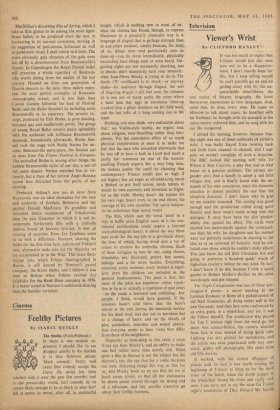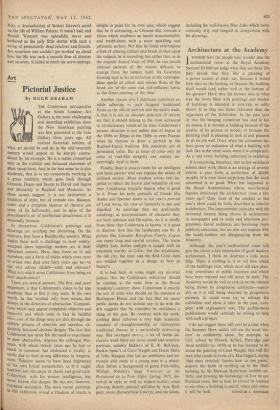Television
Viewer's Wrist
By CLIFFORD HANLEY 1 missed his opening, however, because Sun- day night was one of those outbreaks of viewer's wrist. I was badly frayed from twisting back and forth from channel to channel, and I sup- pose we mustn't complain of such a situation. The BBC looked like starting well with To Whom It May Concern, a play that was at least based on a genuine problem. The earnest do- gooder can't find a family to adopt a sad little refugee boy, and is finally faced with the de- mands of his own conscience, since his domestic situation is almost predisely the one that the adoption demands. I don't know why its grip on me steadily loosened. The casting was good enough and the production rolled along quite fluently and there wasn't much wrong with the dialogue. It must have been the dire predict- ability that spoiled the effect. The cards were stacked too malevolently against the conscienti- ous dad; his wife, his daughters and his mother were too perfectly unanimous in reacting to the idea as to an outbreak of bubonic. And'he col- lected rare china which he couldn't really afford. You just knew the sad little Ukrainian kid was going to pulverise a hundred quids' worth of high-class crockery before he was done. In fact, I don't know if he did, because I took a quick gander at Robert Muller's shocker on the other wavelength, and got trapped.
The Night Conspirators was one of those just- imagine-if pieces: a secret meeting in the Latinian Embassy at Bonn of a picked crowd of old Nazi lieutenants, all doing rather well in the new Germany. And then they were confronted by an extra guest, in a wheelchair, and yes, it was the Filhrer himself. The production was played for Top C tension right from the word go, the decor was science-fiction, the camera wheeled from face to face instead of doing quick cuts. Lighting was also pitched for melodrama, and the action was even punctuated with very con- trasty, grainy still photographs, like shots from old Ufa movies.
It worked, with the violent efficiepcy of prussic acid. In fact, it was worth missing the beginning of Ustinov to hang on for the shrill irony of the finish, when the dumb puppet in the wheelchair found his voice and really took over. I am sorry not to say the same for Friday night's production of They flanged My Saintly Billy, a dramatisation of Robert Graves's novel on the life of William Palmer. It wasn't bad, and Patrick Wymark was splendidly suave and bothered as the jolly little doctor with such a string of -prematurely dead relatives and friends. But somehow one couldn't get worked up about him, his life was such a smooth flow of disaster and recovery. It failed to reach the nerve-endings.



































 Previous page
Previous page